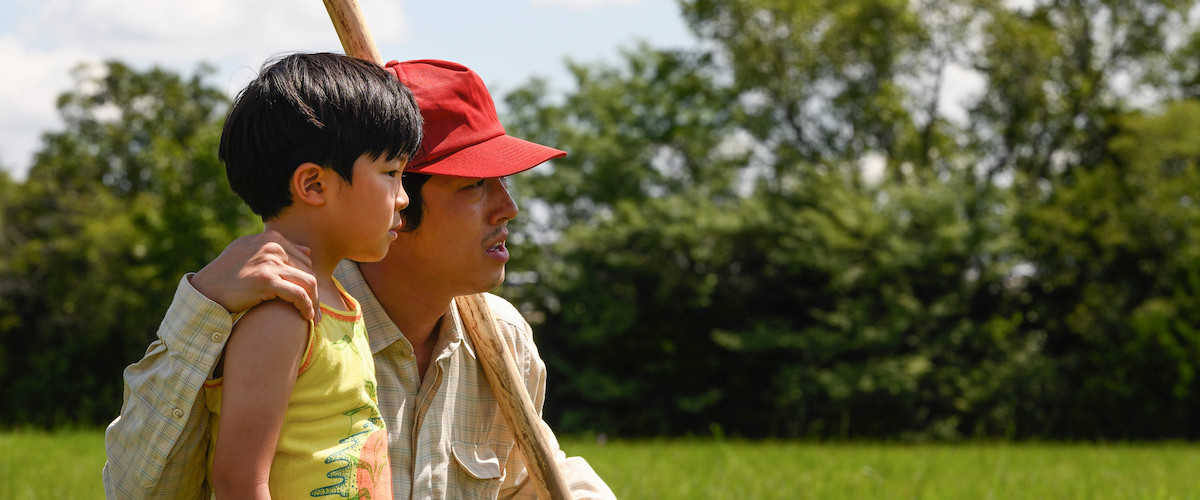During a time that has forced us to disconnect from one another, Minari reminds viewers to remain in touch with our humanity—and remember that our relationships are what make us human. Grounded in the immigrant’s tale, director Lee Isaac Chung unfolds the story of a Korean-American family moving to rural Arkansas. As they attempt to navigate their new life, intergenerational conflicts, and misunderstandings, the family members discover the broken reality of the American Dream. Adding to this complex equation is the arrival of Soonja (Youn Yuh-Jung), the children’s playful Korean grandmother.
Centered around the Yi family—Jacob (Steven Yeun), Monica (Han Ye-Ri), and their children, David (Alan Kim), and Anne (Noel Cho)—Minari is a film that is emotionally grounded in each of its characters. Throughout the movie, Jacob dreams of building a successful farm, not only to sustain his family, but also to reclaim his lost dignity. He longs to become something greater—a man his wife and children can be proud of. However, it is this exact desire that begins to tear apart his relationship with his wife Monica, as Jacob’s efforts to establish the farm cause him to lose sight of his family.
On the other hand, David and Soonja’s relationship struggles. While David wants to distance himself from his Korean grandma in an American society, Soonja persistently works to forge a bond. As his desires to fit in with his white, blue-eyed peers grow, David increasingly rejects Soonja, who “smells like Korea”. David wants a grandma who makes cookies, not kimchi. His older sister, Anne, takes a different approach to the situation. She keeps her thoughts quiet and tries to balance her Korean-American identity alone—a realistic portrayal of the oldest, first-generation immigrant child.
What makes Minari so profound, both as a story and as a piece of cinema, is its poetic approach to portraying an underrepresented experience: the first-generation immigrant narrative. The film relies on powerful visual symbols such as fire, floods, and most significantly, the minari plant as driving metaphors. Just as the vegetable must first die to grow strong in the subsequent season, the Yi family must face a tragedy of their own. First is a troubling flood that ruins the land’s water sources and soil. With the rich dirt sucked dry of moisture and nutrition, the Yi family finds themselves in an equally deprived state. Following this is the destructive fire at the crop house, burning Jacob’s dreams and hard work to ashes. But in this evocative scene, we witness the fire as a bridging rather than as a dividing force. During a tense moment just before the fire, Jacob and Monica are on the brink of a divorce. After they drive back to the house and find the blazing shed, we see a moment of desperation, as they frantically try to salvage the burning vegetation. Monica gets stuck in the fire, and Jacob must make a decision between his crops or his family. When Jacob drops the plants and rushes in to save her, Chung reveals that we are saved by each other, rather than by the ideals of the American Dream.
Color and costume also play a significant role in the film. Jacob’s iconic red cap and David’s blue-and-white polo shirt come together to make a commentary on nationality and assimilation. With red, white, and blue being the colors of both the American and Korean flags, the family’s outfits portray their clashing desires to assimilate but also retain their heritage.
The delicately crafted soundtrack and naturalistic ambience add to this sentiment. Sound is crucial in creating the world of Minari, and it does so gorgeously. Buzzing cicadas, rustling leaves, and the voices of Korean wrestlers on TV all contribute to the viewer’s understanding of the Yi family’s home. It is quiet but cacophonous, still but frantic, beautiful but bittersweet. Emile Mosseri, the soundtrack composer, emphasizes these wild sounds with gentle but evocative melodies. With titles such as “Grandma Picked a Good Spot” to “Jacob’s Prayer”, the film’s music follows the family’s journey each step of the way.
Minari is a quintessential example of the saying, “the more specific we are, the more universal something can become.” It is no wonder that this vulnerable, semi-autobiographical story has moved the hearts of millions around the world. As a first-generation immigrant, and Korean-American daughter, I have never felt more seen by a film than by Lee Isaac Chung’s recent piece. With witty Korean remarks from Soonja, games of hwatu cards in the living room, and Monica forcing David to drink cups of herbal tonic after dinner, each moment and beat overflows with nostalgia.
Just as this film has transported me out of the pandemic, it has also had an immense role within it. Released in 2021 during the rise of anti-Asian hate crimes and sentiments, Minari plays a large role in today’s battle for racial equity. It humanizes the stories of minority communities and hyphenated identities and goes to show that in a melting pot of cultures, filmmaking is an artistic vessel for the human voice.


